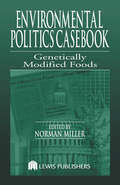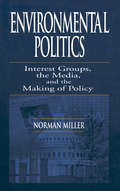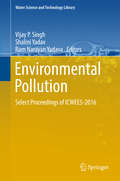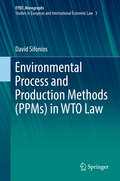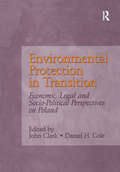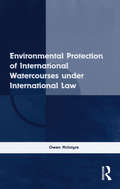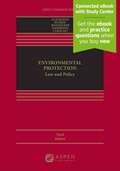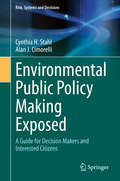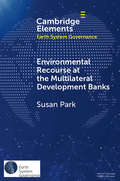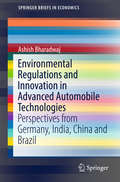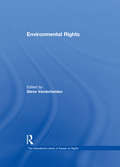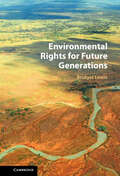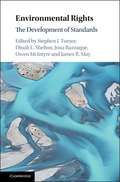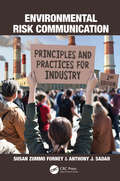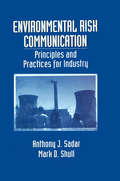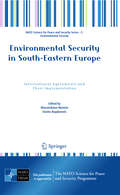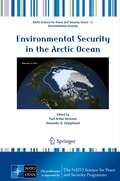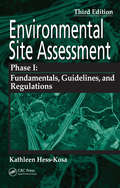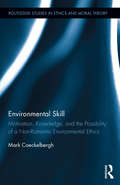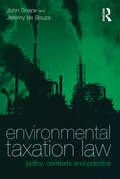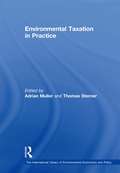- Table View
- List View
Environmental Politics Casebook: Genetically Modified Foods
by Norman MillerEnvironmental Politics Casebook: Genetically Modified Foods includes testimony, journal and newspaper articles, book chapters, and interest group communications such as press releases and on-line briefs, as well as other studies and reports that constitute the principal elements of the public debate on the genetic modification of food. A companion
Environmental Politics: Interest Groups, the Media, and the Making of Policy
by Norman MillerAt every stage, environmental policy is the result of the combat of stakeholders interested in, and affected by, the problem being addressed and the range of possible solutions. The combatants include any or all of the following: the federal government, environmental advocacy groups, and business, the media, the scientific community, think tanks, NGOs of every stripe, trade associations and professional organizations, and even state and local governments, each of whom have their own interests in the resulting policy. Environmental Politics: Interest Groups, the Media, and the Making of Policy discusses political battles over the environment from ground level - as they are fought in legislative chambers, the daily newspaper, on television, and, increasingly, on the Internet. The text explores environmental politics as a clash of interests, not ideologies, and environmental policy as a result of the reconciliation of those interests.
Environmental Pollution
by Vijay P Singh Shalini Yadav Ram Narayan YadavaThis book comprises select proceedings of the International Conference on Water, Environment, Energy and Society. The book is divided into five parts. The first part deals with some aspects of environmental pollution such as socio-economic environment assessment for sustainable development, environmental issues due to fire in coal Mines and its impact and suggestions for implementing precautionary and control measures, redevelopment of urban slum dwellings: issues & challenges, air and noise pollution in mega cities, importance of indoor environmental quality in green buildings. Part II discusses pollution indicators such as assessment and prediction of environmental noise, fuzzy logic based performance evaluation, fish biodiversity and its periodic reduction, effects of anthropogenic activities on fresh water ecosystems, and monitoring of air pollution. Part III focuses on generation of pollution namely biomedical waste generation and management, heavy metal leaching, etc. Water quality assessment is described in Part IV. The Part V presents water quality modeling. The book will be of interest to researchers and practitioners in the field of water resources, hydrology, environmental resources, agricultural engineering, watershed management, earth sciences, as well as those engaged in natural resources planning and management. Graduate students and those wishing to conduct further research in water and environment and their development and management will also find the book to be of value.
Environmental Process and Production Methods (European Yearbook of International Economic Law #3)
by David SifoniosThis book examines the conditions under which PPM measures may be adopted under WTO law de lege lata and de lege ferenda. It analyses in detail the complex case law in this field and its evolution in the last 25 years, as well as the many doctrinal debates around PPM measures and their relevance in the light of the evolution of case law, both under the GATT and the TBT Agreement. Further, it also suggests an original approach to the interpretation of the relevant provisions of the GATT and the TBT Agreement in the context of PPM measures. The PPM issue has been one of the most debated topics in the trade and environment debate. Even though the US-Shrimp case showed that PPM measures are not prohibited per se under the GATT, many questions remain unanswered when it comes to the precise conditions under which environmental PPM measures are justifiable under WTO law, for example in the field of trade measures relating to climate change mitigation efforts, natural resources management policies and biodiversity conservation measures.
Environmental Protection and Human Rights
by Donald K. Anton Dinah SheltonWith unique scholarly analysis and practical discussion, this book provides a comprehensive introduction to the relationship between environmental protection and human rights being formalized into law in many legal systems. This book instructs on environmental techniques and procedures that assist in the protection of human rights. The text provides cogent guidance on a growing international jurisprudence on the promotion and protection of human rights in relation to the environment that has been developed by international and regional human rights bodies and tribunals. It explores a rich body of case law that continues to develop within states on the environmental dimension of the rights to life, to health, and to public participation and access to information. Five compelling contemporary case studies are included that implicate human rights and the environment, ranging from large dam projects to the creation of a new human right to a clean environment.
Environmental Protection in Transition: Economic, Legal and Socio-Political Perspectives on Poland
by John Clark Daniel H. ColeThis book takes an interdisciplinary look at environmental protection during Poland’s transition to market democracy. The contributors are recognised experts in their fields, making this an authoritative volume, combining the perspectives of economists, legal scholars, political scientists and sociologists.
Environmental Protection of International Watercourses under International Law
by Owen McIntyreMcIntyre's work explains the legal means by which requirements of environmental protection influence the determination of a reasonable and equitable regime for allocating rights to riparian states to utilize shared freshwater resources. The work examines the means and processes by which environmental considerations can act upon the operation of the principle of equitable utilization. The volume provides a comprehensive analysis of the subject, outlining the development, scope and operation in general and customary international law of key rules of environmental protection.
Environmental Protection, China and International Trade: Greening the WTO Ban on Chinese Export Duties (The Rule of Law in China and Comparative Perspectives)
by Fengan JiangThis book argues for a balanced approach to ‘greening’ the World Trade Organization (WTO) ban on China’s export duties without opening the floodgates to protectionism. As a result of the China—Raw Materials and China—Rare Earths decisions, China is largely prohibited from using export duties to address environmental problems, including those associated with climate change. This is despite a number of climate studies having suggested that Chinese export duties could be useful for reducing carbon leakage, an issue of international concern. This book puts the case for a more balanced approach. It shows that a harsh ban on China’s export duties constrains its policy space to protect the environment, particularly in the context of climate change. The work presents feasibility tests for various legal solutions that have been discussed for adjusting the ban, and it accordingly proposes a more feasible approach that would allow China to help protect the environment without advancing protectionism. The proposed legal option provides a less protectionist alternative to export duties, namely ‘export duties plus’: export duties in combination with supplementary restrictions on Chinese consumption. This analysis also yields insights regarding ways to correct WTO precedents, which suggests a moderate alternative response to an important issue behind the Appellate Body crisis. The book will be a valuable resource for academics, researchers and policymakers in the areas of International Trade Law, Environmental Law and China.
Environmental Protection: Law and Policy (Aspen Casebook)
by Robert L. Glicksman Emily Hammond William W. Buzbee Alejandro Camacho Daniel R. MandelkerEnvironmental Protection: Law and Policy, respected for its intellectual breadth and depth, is an interdisciplinary overview of Environmental Law, incorporating history, theory, litigation, regulation, policy, science, economics, and ethics. It covers the history of environmental protection; policy objectives; regulatory design strategies; and constitutional federalism and related statutory interpretation issues concerning the design and implementation of the environmental laws. <p><p>Coverage also includes the Clean Air Act, the Clean Water Act, the Resource Conservation and Recovery Act, CERCLA, and other pollution control statutes; a chapter on climate change that discusses scientific, policy, program design, and statutory authority questions; and natural resource management issues (including the National Environmental Policy Act, the Endangered Species Act, and limited coverage of national forest management).
Environmental Public Interest Litigation in China
by Xiaobo Zhao Xi Wang Noeleen McNamaraThis book offers readers an accessible and broad-ranging guide to Environmental Public Interest Litigation (EPIL), which has burgeoned in China over the past decade. The aim of this book is to provide a systematic review of Chinese experiences with EPIL in environmental matters, both with a view to gauging its success to date and well as discussing some more critical aspects. To this end, the book systematically examines the establishment and development of EPIL in China's legal, social, and political contexts. It examines particularly the significant role and functions of EPIL in China's environmental governance, and the far-reaching impacts on Chinese civil society and governments. It also offers readers an insiders' perspective in terms of procedural and substantive issues with respect to EPIL, by reviewing the institutional designs, theoretical underpinnings and specific mechanisms, the roles of various participants and stakeholders involved in this legal process. At the same time, it studies leading EPIL cases raised from environmental pollution, natural resource damage and ecological damage, and the effectiveness of environmental adjudication that sustains EPIL as a new form of judicial instrument. This book is written to remedy the gap between Chinese and English literature in this area of law. The analysis of these issues, through a historic and comparative perspective, reveals the strengths and weaknesses of the current legal regime and serves as a basis for recommendations for bringing about more effective EPIL in China.
Environmental Public Policy Making Exposed: A Guide for Decision Makers and Interested Citizens (Risk, Systems and Decisions)
by Cynthia H. Stahl Alan J. CimorelliThis book exposes the barriers to inclusive and effective public policy making, which are the current decision making paradigm and commonly held ideas that reduce public policy problems to scientific and technical ones. Through both environmental policy and other decision making examples, readers are shown the commonalities of all decision making. Solution-oriented practitioners and stakeholders will find this book filling a conceptual and methodological gap in existing policy literature and practice. The authors deftly guide readers from post-normal science, wicked problems, and uncertainty concepts to a conceptually-grounded, practical implementation of a new approach, the open solution approach. The Multi-criteria Integrated Resource Assessment (MIRA) is described as the first generation methodology that fulfills the expectations for the inclusive, transparent, and learning-based open solutions approach. MIRA is a holistic package of concepts, methods and analytical tools that is designed to assess Decision Uncertainty, the combined uncertainties that include data, problem formulation, expert judgments, and stakeholder opinions. Introduction of the Requisite Steps, the common steps found in all decision making, provides the yardstick for evaluating a variety of decision making processes, decision tools, and commonly found indices such as the Dow Jones Industrial Average or the Newsweek Green Ranking of corporations. The use of anecdotes, policy stories, and case examples makes this a very readable and practical book for citizens and experts. With this book, readers are prepared to critically evaluate these common indices for their personal use as well as challenge policy processes as a stakeholder. For policy practitioners, this guidebook will become a rubric to ensure an effective public policy making process and to critically evaluate decision support tools.
Environmental Recourse at the Multilateral Development Banks (Elements in Earth System Governance)
by Susan ParkGlobal governance now provides people with recourse for harm through International Grievance Mechanisms, such as the Independent Accountability Mechanisms of the Multilateral Development Banks. Yet little is known about how such mechanisms work. This Element examines how IGMs provide recourse for infringements of three procedural environmental rights: access to information, access to participation, and access to justice in environmental matters, as well as environmental protections drawn from the United Nations Guiding Principles and the World Bank's protection standards. A content analysis of 394 original IAM claims details how people invoke these rights. The sections then unpack how the IAMs provide community engagement through 'problem solving', and 'compliance investigations' that identify whether the harm resulted from the MDBs. Using a database of all known submissions to the IAMs (1,052 claims from 1994 to mid-2019), this Element demonstrate how the IAMs enable people to air their grievances, without necessarily solving their problems.
Environmental Regulation and the History of Capitalism: The Role of Business from Stockholm 1972 to the Climate Crisis (Routledge International Studies in Business History)
by Sandra Bott Janick Marina Schaufelbuehl Sabine PitteloudThis edited collection examines the historical role of business actors in climate and environmental governance since the 1970s. Through a compilation of recent, evidence-based historical research, this book unveils the origins of contemporary challenges in regulating environmental pollution. With original case studies, it offers a nuanced understanding of the environmental counter-offensive orchestrated by business leaders, associations, and think tanks post-1972, following the United Nations' pivotal Stockholm Conference on the Human Environment. Readers are presented with insights into the historical maneuvers of business entities aimed at mitigating regulatory risks, co-creating expertise, and framing the environmental debate. From revealing the tactics employed by various business actors to exploring the emergence of market-driven environmentalism, this volume offers a comprehensive exploration of the intricate dynamics shaping environmental policy. By contextualizing specificities and complexities, it enriches contemporary narratives on business influence and power dynamics within global capitalism. This book primarily caters to scholars across diverse historical disciplines, including business history, international relations, environmental history, and the history of capitalism. Additionally, it holds relevance for social scientists studying contemporary issues, policymakers grappling with environmental challenges, and those seeking a deeper understanding of the historical dimensions of climate governance.The Open Access version of this book, available at http://www.taylorfrancis.com, has been made available under a Creative Commons Attribution-Non Commercial-No Derivatives (CC BY-NC-ND) 4.0 license.
Environmental Regulations and Innovation in Advanced Automobile Technologies: Perspectives From Germany, India, China And Brazil (SpringerBriefs in Economics)
by Ashish BharadwajThe book examines innovation in environment-friendly technologies in the automobile industry. The focus of the book are Germany (a technology leader in the global automobile industry), on the one hand, and India, China and Brazil (technologically proficient emerging technology leaders) on the other hand. Patents have been used as a metric to measure and understand innovation. The book traces the evolution of regulatory standards in the automobile industry, relies on a unique patent dataset, and draws on a number of interviews conducted with regulators and engineers to get a better picture of how environmental policies and standards, including emission norms and fuel requirements, have developed overtime and now the industry has responded. The book’s core argument is that technological innovation is what has driven the industry in the past 125 years, but, at the same time, the industry has created problems and faced controversies with regard to its path dependency on carbon-intensive technologies. As a result, we have witnessed growing role of environmental regulators in ensuring that the growth path of the automobile industry, a powerhouse of growth of several economies, is aligned with the larger goals of addressing climate change and energy concerns. Against the backdrop of the emergence of Brazil, China and India in the global economy, the book focuses on the developments in these three countries, and draws parallels with Germany, which benefited from first mover advantage in technology and a substantial head-start in implementing cogent environmental policies. A standardized International Patent Classification (IPC) system has been used to, first, construct an index of regulatory stringency, based on regulations that came about between 1985 and 2010; and second, construct a unique cross-country weighted patent dataset for technologies invented in the past two and a half decades.
Environmental Rights (The\international Library Of Essays On Rights Ser.)
by Steve VanderheidenThe essays selected for this volume present critical viewpoints from the debate about the need to establish rights on behalf of greater environmental protection. Three main areas for developing environmental rights are surveyed, including: extensionist theories that link existing rights (for example to subsistence or territory) to threats of harm from exacerbated resource scarcity, pollution or rapid environmental change; proposals for rights to specified environmental goods or services, such as rights to a safe environment and the capacity to assimilate greenhouse gas emissions; and rights that protect the interests of parties not currently recognized as having rights, including nonhuman subjects, natural objects and future generations. This volume captures the potential for and primary challenges to the development of rights as instruments for safeguarding the planet's life-support capacities and features proposals and analyses which argue the need to create an avenue of recourse against ecological degradation, whether on behalf of human or nonhuman right holders.
Environmental Rights for Future Generations
by Bridget LewisThis book presents readers with a new theory and practice of international human rights law that is designed to improve its protection of the environmental rights of future generations. Arguing that international law is currently unable to safeguard future generations from foreseeable environmental harm, Bridget Lewis proposes that the law needs to be reformed in the interests of achieving intergenerational justice. The book draws on different theories of intergenerational responsibility to articulate a fresh approach, revising both substantive principles of environmental rights and procedural rules of admissibility and standing. It looks at several case studies to explore how the proposed new approach would apply in relation to contemporary environmental challenges like fracking, deep seabed mining, nuclear energy, decarbonisation and geoengineering.
Environmental Rights: The Development of Standards (Routledge Explorations in Environmental Studies)
by James R. May Jona Razzaque Owen McIntyre Stephen J. Turner Dinah L. SheltonEnvironmental rights, also known as the human rights or constitutional rights that are used for the protection of the environment, have proliferated over the last forty-five years. However, the precise levels of protection that they represent has since been a major question associated with this phenomenon. Environmental Rights: The Development of Standards systematically investigates this question by analyzing the emerging standards of environmental protection that are associated with such rights and the way that those associations are becoming formalized. It covers all of the relevant human rights treaties to illustrate how environmental rights standards are emerging in this dynamic area. Bringing together an elite group of scholars, this book discusses significant new insights into the way that environmental rights are developing, the standards of protection that they confer, and the way that standards in the field of environmental rights can potentially be further developed in the future.
Environmental Risk Communication: Principles and Practices for Industry
by Susan Zummo Forney Anthony J. SadarModern industry faces many communication challenges, including social media. The second edition of this book is thoroughly updated, expanded, and reorganized to help industry communicators remain effective in addressing these challenges. At the core of this book are foundational building blocks that address the human factors responsible for driving success or failure when communicating about environmental risk. Features Provides principled guidance for building relationships and engaging in constructive dialogue with stakeholders. Offers straight talk and practical, easy-to-follow guidance on effective risk communication for various situations, stakeholders, and modes of communication. Gives lessons learned from environmental permitting and crisis situations involving risk communication in various industries, including chemical manufacturing, waste management, and the energy sector. Addresses nuanced, recent concerns regarding issues like fake news and social media bullying. Examines the dos and don’ts of communicating effectively during tough conditions like environmental emergencies. Environmental Risk Communication: Principles and Practices for Industry is intended to be both a grounding in enduring principles and a continued resource for best approaches and techniques. Coupled with tools and best practices from decades of experience, this insider’s guide provides CEOs, plant managers, environmental compliance professionals, health and safety officers, and others with the direction and the confidence needed to prepare for difficult dialogue and high-pressure encounters.
Environmental Risk Communication: Principles and Practices for Industry
by Anthony Sadar Mark ShullA public meeting with angry residents and eager reporters is a common feature on the local news. Whether addressing environmental, or other issues, the experience for the board members, consultants, and specialists at these meetings ranges from uncomfortable to nightmarish. The issues discussed in these meetings usually stem from years of community disappointment, mistrust, fears, factions, political or social positioning, or all of the above. Industry faces a labyrinth of environmental and business regulations, and unique challenges in dealing with the public and the media. Environmental Risk Communication serves as a guide to understanding and complying with the Federal Risk Management Program and applying risk management and communication principles to daily plant operations. This book also helps Risk Management Plan (RMP) facilities successfully meet the new Federal requirements for public disclosure of RMP offsite consequence analysis results and provides techniques for communicating effectively during environmental emergencies.Written in a straight-forward, no-nonsense style the book presents concise informative chapters, flow diagrams, checklists, and a thorough index. The authors present step-by-step instruction on developing a principled plan of action that generates open communications. CEOs, Corporate Communications Specialists, Plant Managers, Environmental Compliance Supervisors, Health and Safety Officers, Environmental Scientists and Engineers, and Consultants will benefit from Environmental Risk Communication.
Environmental Security in South-Eastern Europe
by Massimiliano Montini Slavko BogdanovicAuthored by international experts from academia, international organizations, governments and NGOs, this book highlights the main environmental security issues in the South-East European (SEE) countries, with a particular focus on climate change and water management. The common goal of the authors was to provide a reliable evaluation of whether existing legal regimes and correct implementation of applicable international treaties may contribute to reducing environmental security risks in the region. In-depth analyses and assessment of major challenges in compliance, serve as a firm ground which such evaluation is based on. This volume is recommended for public officials, legal practitioners and consultants. Its interest may also extend beyond the SEE countries, serving as a case-study of a broader and paradigmatic relevance of the analysis and management of environmental and security issues in a trans-boundary context.
Environmental Security in the Arctic Ocean
by Paul Arthur Berkman Alexander N. VylegzhaninThis seminal book results from a NATO Advanced Research Workshop at the University of Cambridge with Russian co-directorship, enabling the first formal dialogue between NATO and Russia about security issues in the Arctic Ocean. Involving interdisciplinary participation with experts from 17 nations, including all of the Arctic states, this workshop itself reflects progress in Arctic cooperation and collaboration. Interests now are awakening globally to take advantage of extensive energy, shipping, fishing and tourism opportunities in the Arctic Ocean as it is being transformed from a permanent sea-ice cap to a seasonally ice-free sea. This environmental state-change is introducing inherent risks of political, economic and cultural instabilities that are centralized among the Arctic states and indigenous peoples with repercussions globally. Responding with urgency, environmental security is presented as an "integrated approach for assessing and responding to the risks as well as the opportunities generated by an environmental state-change." In this book - diverse perspectives on environmental security in the Arctic Ocean are shared in chapters from high-level diplomats, parliamentarians and government officials of Arctic and non-Arctic states; leaders of Arctic indigenous peoples organizations; international law advisors from Arctic states as well as the United Nations; directors of inter-governmental organizations and non-governmental organizations; managers of multi-national corporations; political scientists, historians and economists; along with Earth system scientists and oceanographers. Building on the "common arctic issues" of "sustainable development and environmental protection" established by the Arctic Council - environmental security offers an holistic approach to assess opportunities and risks as well as develop infrastructure responses with law of the sea as the key "international legal framework" to "promote the peaceful uses" of the Arctic Ocean. With vision for future generations, environmental security is a path to balance national interests and common interests in the Arctic Ocean for the lasting benefit of all.
Environmental Site Assessment Phase I: A Basic Guide, Third Edition
by Kathleen Hess-KosaExtensively updated, this third edition provides a valuable guide to the tools and techniques used to perform Phase 1 site assessment. This book elucidates the systematic processes and methods used by leaders in the industry. It also emphasizes the development of an easy-to-follow investigative strategy for in-house assessment. After reviewing the history of the field, legal issues, and important terms, the book discusses physical setting, historic usage, property and area reconnaissance, building materials, and industrial activities associated with a property. It also gives interviewing tips, lists regulatory agencies, and considers unique situations such as wetlands and historical buildings.
Environmental Skill: Motivation, Knowledge, and the Possibility of a Non-Romantic Environmental Ethics (Routledge Studies in Ethics and Moral Theory)
by Mark CoeckelberghToday it is widely recognized that we face urgent and serious environmental problems and we know much about them, yet we do very little. What explains this lack of motivation and change? Why is it so hard to change our lives? This book addresses this question by means of a philosophical inquiry into the conditions of possibility for environmental change. It discusses how we can become more motivated to do environmental good and what kind of knowledge we need for this, and explores the relations between motivation, knowledge, and modernity. After reviewing a broad range of possible philosophical and psychological responses to environmental apathy and inertia, the author argues for moving away from a modern focus on either detached reason and control (Stoicism and Enlightenment reason) or the natural, the sentiments, and the authentic (Romanticism), both of which make possible disengaging and alienating modes of relating to our environment. Instead he develops the notion of environmental skill: a concept that bridges the gap between knowledge and action, re-interprets environmental virtue, and suggests an environmental ethics centered on experience, know-how and skillful engagement with our environment. The author then explores the implications of this ethics for our lives: it changes the way we think about , and deal with, health, food, animals, energy, climate change, politics, and technology.
Environmental Taxation Law: Policy, Contexts and Practice
by John Snape Jeremy de SouzaThe theoretical arguments for environmental taxes and other types of economic instruments for environmental protection have been discussed extensively in the literature. Rather less well discussed has been the extremely complex form that such instruments have in fact taken in practice. Environmental Taxation Law: Policy, Contexts and Practice examines the legal implications of introducing environmental taxes and other economic instruments into the regulatory framework of UK law. In doing so, it analyzes and explains the difficulties of grafting environmental taxes onto the complexities of existing regulatory structures, not all of which, of course, were originally devised with environmental considerations in mind. Although the focus of the book is the UK's pioneering implementation of a web of distinct yet interrelated policy measures, it locates the UK's taxes and instruments not simply in their broader context of market and environmental regulation, but also in the contexts of European and international law.
Environmental Taxation in Practice (The International Library of Environmental Economics and Policy)
by Thomas SternerSince the 1980's, market-based instruments for environmental policy have become increasingly important. Focusing on environmental taxation in practice, this volume collects key contributions on a wide range of topics, including comparisons of environmental taxation schemes in different countries, political economy issues and key aspects of concrete implementation. It presents a wealth of ex-ante and ex-post analyses, intended as a source of guidance for policy implementation and research. The volume features a full-length introduction locating the literature on environmental taxation in practice in a wider context of theoretical and applied issues.
